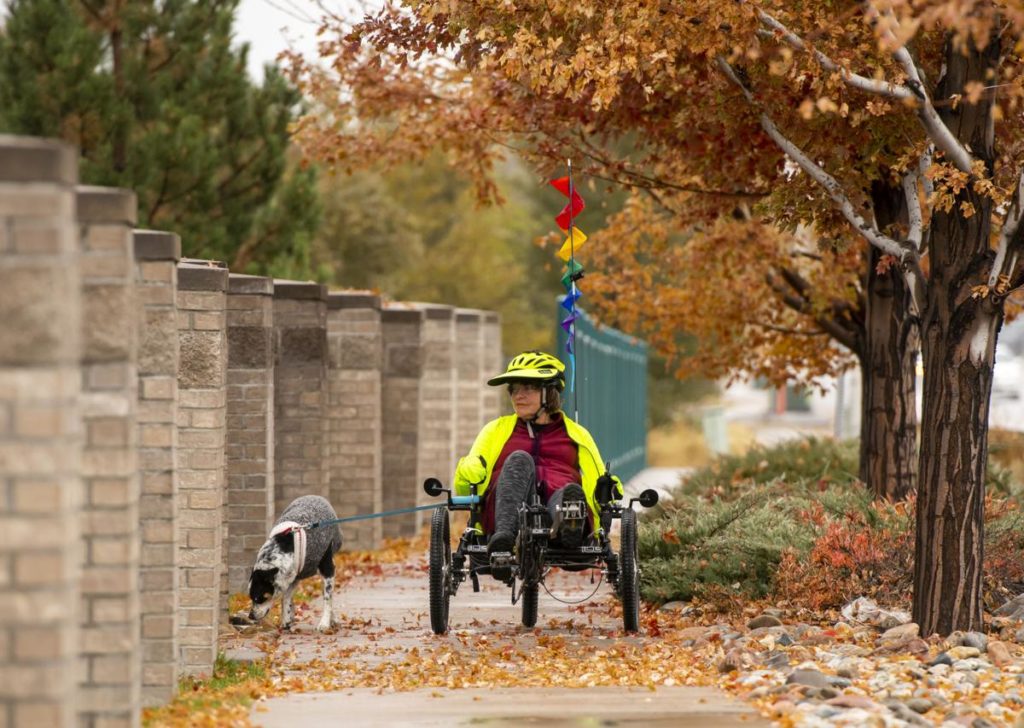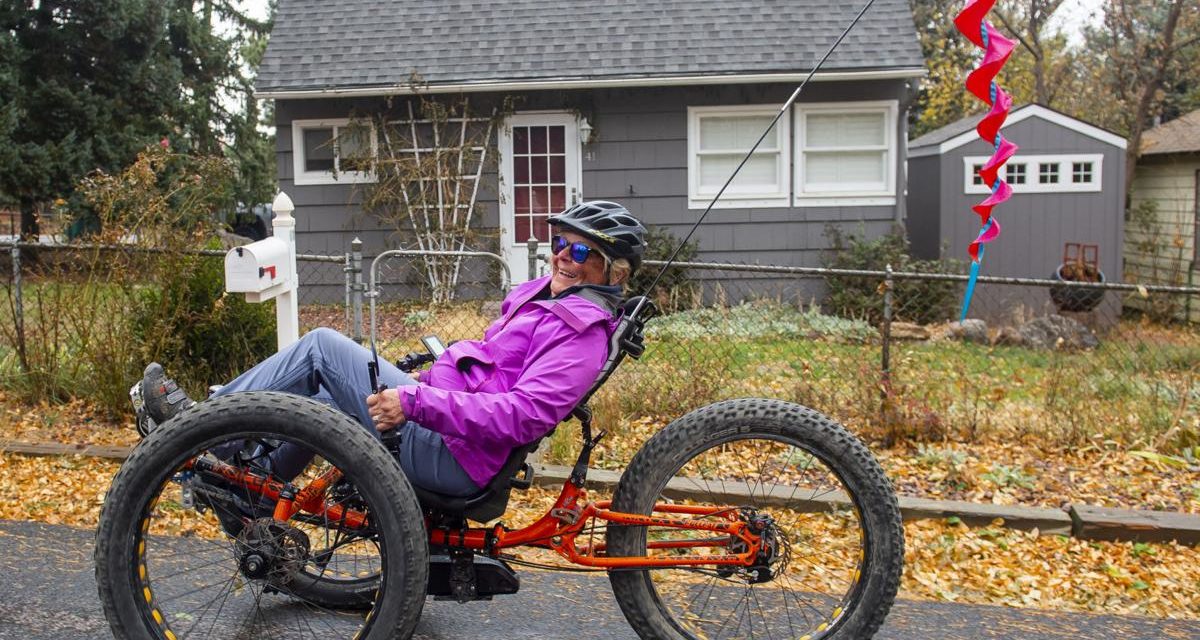With the same cleats she’s worn for 12 years, she clicks into the same pedals she’s known for about the same time.
It’s just the bike that’s different.
Linda Tripp leans in the seat as if it’s a beach chair but equipped with three burly tires. Maybe people have seen a fat bike, but maybe they haven’t seen a fat trike.
“That is so cool! Wow!” remarks a passerby on this trail near Tripp’s home in Cheyenne Cañon, a woman appearing to be her same retirement age.
“Doesn’t it feel so good to be outside?” she later asks.
For Tripp, the answer always has been a resounding “yes.” She calls her ride “the mother of all trikes,” and like any good mother, it nurtures. It is how she still can hit the trails no matter the terrain, to breathe in the fresh air she’s always sought.
Two years ago, when she was diagnosed with a neurodegenerative disease, she feared this part of her life was over. She’d been an avid mountain biker since 1987.
“When I was able to renew this passion, that’s what’s been so special for me,” she says. “Now that I’ve developed ALS, life is a struggle. But when I get on my trike, I leave that struggle behind. I can just ride and be happy and be free. Life is good.”
Jesse Jakomait, Colorado Springs’ hard-core cyclist, doesn’t need another record

Gail Weien rides her trike with her dog Beauregard around the neighborhood.
The three-wheeler requires none of the balance that an upright bike requires, balance that Tripp no longer can achieve. With her failing strength, she requires “Sherpas” — family and friends who help her load and unload the contraption and navigate rougher mountain terrain.
Allen Beauchamp is one of these. And Tripp’s is just one story he’s heard in his many years of recumbent advocacy.
He hosts regular rides for Colorado Springs’ Therapeutic Recreation Program, leading usually a dozen people who’ve found joy on the trikes.
“They install what I call the permagrin,” Beauchamp says — the permanent grin.
He used to work at AngleTech, the city’s go-to shop for adaptive cycling and a leader in a burgeoning industry. Kelvin Clark, whose family has been in the bike business since the 1970s, decided to go full-trike as sales started outpacing the two-wheelers.
Retailers and manufacturers credit active baby boomers for the market. But as his business has seen a 90 percent growth over the past five years, Clark also has seen a perception shift.
“A guy who just bought a trike a few minutes ago, he came here for a demo, and he wanted to ride a bike because he thought trikes were for, what was the word he used? It wasn’t ‘wimps’ or ‘sissies,’ but it was something like that.
“Well, he rode a couple of bikes, one trike, and after one lap, he had a big smile on his face. He just bought a trike, and he hasn’t lost his manhood.”
At AngleTech, “everything that leaves our doors has a different story,” says mechanic Kirk Barrett. “That’s what makes it fun and exciting.”
Sometimes, the stories have nothing to do with an injury or life-changing disease. Sometimes, it’s just someone looking for fun — exactly what made trikes known in the first place, as vehicles for British tours.
Now they’re entering the mainstream.
“The big thing is, people are getting tired of sitting on a small seat and the pain usually associated with an upright bike,” says Jeff Yonker, marketing director for Michigan-based TerraTrike, a top manufacturer. “The other thing is, it’s just so much fun. It’s like a little go-kart.”
TerraTrike’s Rover in 2009 introduced the market to a new comfort level and price point, $1,200. “Since then, it’s been like gangbusters. We’ve grown every year,” Yonker says. That’s been as much as 40 percent, he says.
And that’s largely thanks to people like Gail Weien and her husband, Bob, who have been pedaling trikes around the Springs for about 10 years. “Biking is too fast, walking is too slow, and triking is just right,” she says.
An added benefit is the horizon-to-sky view from the reclined seat. “You can look at the trees, the nature all around, look at the creek, see how the creek is flowing.”
It is a peace that Tripp thought would be banished by her diagnosis. She considers herself in “slow decline,” but these are bad thoughts that only occur to her while sitting, doing nothing.
“Tomorrow is too scary to think about. I don’t know what will happen tomorrow,” she says in her trike. “So I better damn well live today.”
Then, she takes off.
 Linda Tripp is an adaptive rider because of an injury and her ALS.
Linda Tripp is an adaptive rider because of an injury and her ALS. 



Comment on: Three-Wheel Popularity Growing Across Colorado